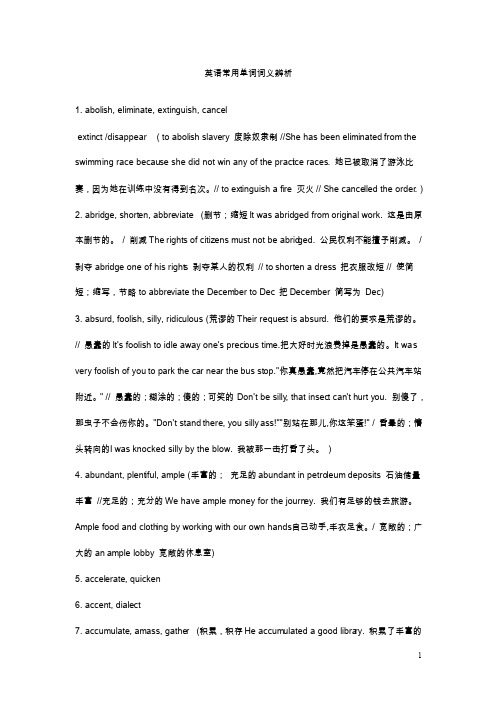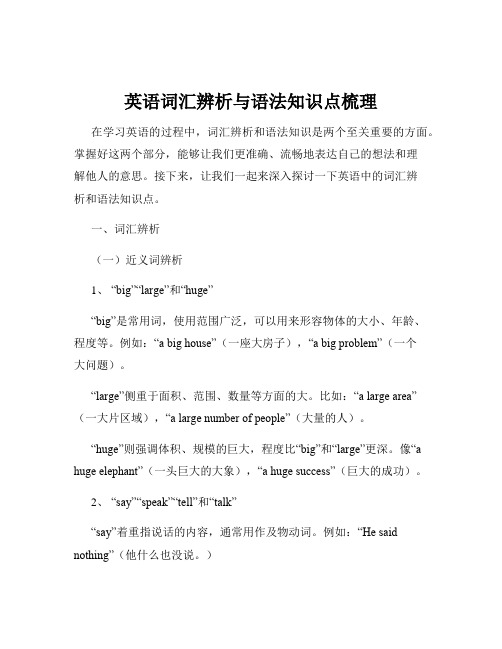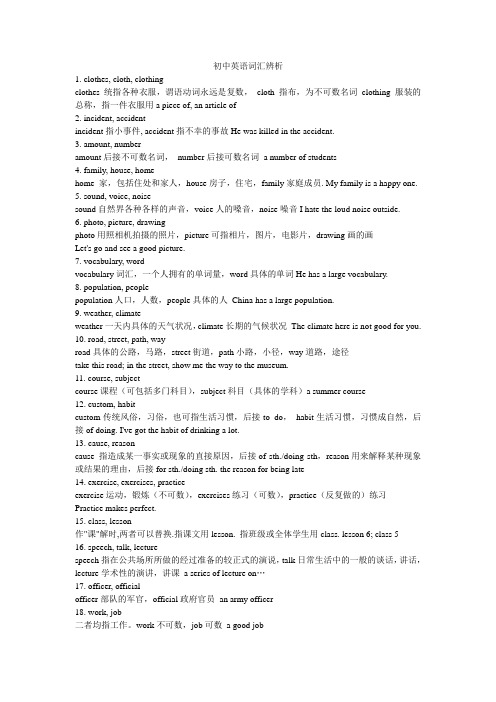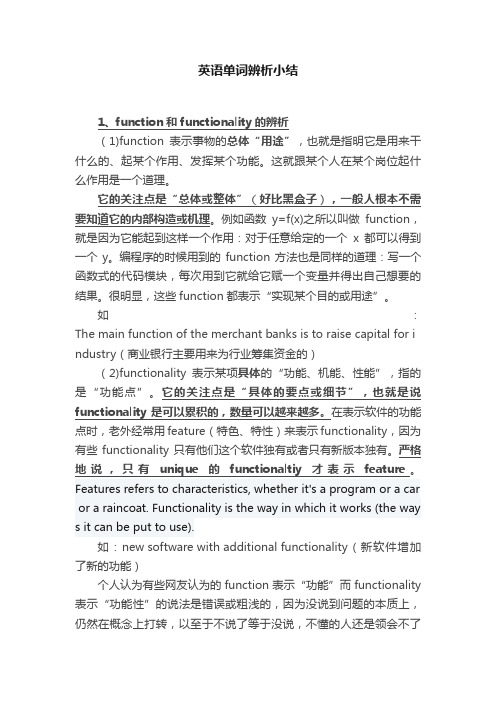常见英语词汇辨析_超好总结版
高中英语重点词汇辨析900例精校版直接打印

- 1 -高中英语重点词语辨析900例都有“指责,控告”之意,有时可通用,但结构不一样。
accuse 不一定针对重大过失或罪行,其结构为accuse sb of sth 。
而charge 一般用于重大过失或罪行,其结构为charge sb with sth ,此结构还有“使某人负有……责任”之意。
例如:例1:My father accused me of my being too careless. (父亲责备我太粗心。
) 例2:He accused me of neglecting my duty. (他指控我玩忽职守。
) 例3:He charged me with neglecting my duty. (同上)例4:Jimmy was charged with murder. (吉米被控谋杀。
)(他担负有一项重要任务。
) :把……加到。
例如: 例6:At the end of the party, we added another program. 例7:You needn’t add any water to the medicine.add to :增添。
指增添喜悦、悲伤、麻烦等。
例如:例8:His coming added to our trouble. (他的到来给我们添了麻烦。
)add up :加起来。
例如:例9:Have you added up all the numbers?add up to :总计。
表示加起来的结果,无被动结构。
例如:例11:I advised (his) trying again. (= suggest)例12:I advised that we (should) try again. (= suggest ,虚拟语气。
) 例13:I advised him to give up smoking. 例14:I advised him not to smoke.例15:Could you advise us on how to learn English?例16:Could you give us some advice on how to learn English?suggest :建议,表明,暗示。
高中英语重点词汇、词组辨析(非常好)

高中英语重点词汇、词组辨析1.above all, after all, at all, in allabove all表示“最重要,首先”,常置于句首或句中,作插入语,起强调作用。
Above all, we have won the game.after all表示“毕竟,终究,终归,到底”,在句中位置较灵活。
Jessica has turned out to be a nice girl after all.at all表示“根本”。
I don’t like Mexican food at all.in all表示“总共”,既可放在句首,也可放在句末。
We have learned 2500 English words in all.2. accept, receiveaccept表示“接受”的意思,是有意识的。
I’ve received a gift from him, but I’m not going to accept it. receive表示“收到”的意思,是无意识的。
Did you receive any letters today?3. add, add to, add...to, add up toadd表示“增加,添加,计算……总和,补充说”。
If the water is too cold, add some more hot water.add to表示“增添,增加,增进”。
The heavy snow added to our difficulties.add...to表示“把……加到……”。
Add ten to forty, and you will get fifty.add up to表示“合计达到”,该短语不用于被动语态。
All his school education added up to no more than one year.4. admit sb./sth. to..., admit of, admit toadmit sb./sth. to表示“……允许某人或某物进入某处”。
英语常用单词词义辨析

英语常用单词词义辨析1. abolis h, elimin ate, exting uish, cancelextinc t /disapp ear (to abolis h slaver y 废除奴隶制//She has been elimin atedfrom the swimmi ng race becaus e she did not win any of the practi ce races.她已被取消了游泳比赛,因为她在训练中没有得到名次。
// to exting uisha fire 灭火 // She cancel led the order.)2. abridg e, shorte n, abbrev iate(删节;缩短It was abridg ed from origin al work. 这是由原本删节的。
/ 削减Therights of citize ns must not be abridg ed. 公民权利不能擅予削减。
/ 剥夺abri dge one of his rights剥夺某人的权利// to shorte n a dress把衣服改短// 使简短;缩写,节略to abbrev iatethe Decemb er to Dec 把Decem ber 简写为Dec)3. absurd, foolis h, silly, ridicu lous(荒谬的The ir reques t is absurd. 他们的要求是荒谬的。
// 愚蠢的It's foolis h to idle away one's precio us time.把大好时光浪费掉是愚蠢的。
It was very foolis h of you to park the car near the bus stop."你真愚蠢,竟然把汽车停在公共汽车站附近。
常见英语词语辨析整理

让知识带有温度。
常见英语词语辨析整理
常见英语词语辨析
attribute, ascribe
这两个动词均有“把……归于”之意。
1.attribute :指出于信任而把……归于某人或某物,含较多的客观性。
例如:He attributes his success to working hard.(他认为他的胜利是艰苦工作的结果。
)
2.ascribe :指依据推论或猜想把……归于某人或某物,含主观臆断成分较重。
例如:Darren ascribed his success to luck.(达伦把他的胜利归因于运气。
)
author, writer
这两个名词均有“,作家”之意。
1.author :泛指用自己名字或笔名发表过作品的人,不强调是否以写作为主职业。
例如:Do you read many French authors?(你阅读过很多法国作家写的书吗?)
第1页/共2页
千里之行,始于足下。
2.writer :含义广泛,一般指以写作为职业的人。
例如:Dickens was a famous English writer.(狄更斯是英国闻名作家。
)
【常见英语词语辨析】
文档内容到此结束,欢迎大家下载、修改、丰富并分享给更多有需要的人。
第2页/共2页。
初中英语常用词语辨析大全

初中英语常用词语辨析-从A ...................................................... .......1.at the moment\in a moment\for a moment\at the moment=right now"此时此刻",用于现在时。
in a moment = very soon “很快,立即”,一般用于将来时的句子。
for a moment “此刻,一会儿”表示时间的延续。
[例] He is out at the moment.此刻他不在家。
I will come back in a moment.我一会儿就回来。
Hold on for a moment.请稍候。
...................................................... .......2.a few/ few(1)a few, few 用来修饰可数名词。
(2)a few “有一些”,表示肯定概念,few 几乎没有,表示否定意义。
[例] The man has been here for many years, so he has a few friends.这个人在这里住了很多年了,他有一些朋友。
I am a new comer here, so I have few friends here.我刚来到这里,所以我在这里没有几个朋友。
...................................................... .......3.a little/ little(1) a little, little 用于修饰不可数名词。
(2) a little “有一些”,表示肯定概念。
little “几乎没有”,表示否定概念。
[例] There is a little water in the glass.杯子里有一些水。
英语词汇辨析与语法知识点梳理

英语词汇辨析与语法知识点梳理在学习英语的过程中,词汇辨析和语法知识是两个至关重要的方面。
掌握好这两个部分,能够让我们更准确、流畅地表达自己的想法和理解他人的意思。
接下来,让我们一起来深入探讨一下英语中的词汇辨析和语法知识点。
一、词汇辨析(一)近义词辨析1、“big”“large”和“huge”“big”是常用词,使用范围广泛,可以用来形容物体的大小、年龄、程度等。
例如:“a big house”(一座大房子),“a big problem”(一个大问题)。
“large”侧重于面积、范围、数量等方面的大。
比如:“a large area”(一大片区域),“a large number of people”(大量的人)。
“huge”则强调体积、规模的巨大,程度比“big”和“large”更深。
像“a huge elephant”(一头巨大的大象),“a huge success”(巨大的成功)。
2、“say”“speak”“tell”和“talk”“say”着重指说话的内容,通常用作及物动词。
例如:“He said nothing”(他什么也没说。
)“speak”常指说某种语言或在公开场合发言。
比如:“She speaks English very well”(她英语说得很好。
)“He will speak at the meeting”(他将在会议上发言。
)“tell”意为“告诉”,常接双宾语。
像“Tell me the truth”(告诉我真相。
)“talk”强调双方交流、交谈,是不及物动词。
例如:“They are talking happily”(他们正愉快地交谈着。
)(二)形近词辨析1、“quite”和“quiet”“quite”意思是“相当;完全”,是一个副词。
例如:“It's quite cold today”(今天相当冷。
)“quiet”意思是“安静的;平静的”,是形容词。
比如:“Keep quiet in the library”(在图书馆保持安静。
(完整)初中英语词汇辨析

初中英语词汇辨析1. clothes, cloth, clothingclothes统指各种衣服,谓语动词永远是复数,cloth指布,为不可数名词clothing 服装的总称,指一件衣服用a piece of, an article of2. incident, accidentincident指小事件, accident指不幸的事故He was killed in the accident.3. amount, numberamount后接不可数名词,number后接可数名词a number of students4. family, house, homehome 家,包括住处和家人,house房子,住宅,family家庭成员. My family is a happy one.5. sound, voice, noisesound自然界各种各样的声音,voice人的嗓音,noise噪音I hate the loud noise outside.6. photo, picture, drawingphoto用照相机拍摄的照片,picture可指相片,图片,电影片,drawing画的画Let's go and see a good picture.7. vocabulary, wordvocabulary词汇,一个人拥有的单词量,word具体的单词He has a large vocabulary.8. population, peoplepopulation人口,人数,people具体的人China has a large population.9. weather, climateweather一天内具体的天气状况,climate长期的气候状况The climate here is not good for you.10. road, street, path, wayroad具体的公路,马路,street街道,path小路,小径,way道路,途径take this road; in the street, show me the way to the museum.11. course, subjectcourse课程(可包括多门科目),subject科目(具体的学科)a summer course12. custom, habitcustom传统风俗,习俗,也可指生活习惯,后接to do,habit生活习惯,习惯成自然,后接of doing. I've got the habit of drinking a lot.13. cause, reasoncause 指造成某一事实或现象的直接原因,后接of sth./doing sth,reason用来解释某种现象或结果的理由,后接for sth./doing sth. the reason for being late14. exercise, exercises, practiceexercise运动,锻炼(不可数),exercises练习(可数),practice(反复做的)练习Practice makes perfect.15. class, lesson作"课"解时,两者可以替换.指课文用lesson. 指班级或全体学生用class. lesson 6; class 516. speech, talk, lecturespeech指在公共场所所做的经过准备的较正式的演说,talk日常生活中的一般的谈话,讲话,lecture学术性的演讲,讲课a series of lecture on…17. officer, officialofficer部队的军官,official政府官员an army officer18. work, job二者均指工作。
英语单词辨析小结

英语单词辨析小结1、function和functionality的辨析(1)function表示事物的总体“用途”,也就是指明它是用来干什么的、起某个作用、发挥某个功能。
这就跟某个人在某个岗位起什么作用是一个道理。
它的关注点是“总体或整体”(好比黑盒子),一般人根本不需要知道它的内部构造或机理。
例如函数y=f(x)之所以叫做function,就是因为它能起到这样一个作用:对于任意给定的一个x都可以得到一个y。
编程序的时候用到的function方法也是同样的道理:写一个函数式的代码模块,每次用到它就给它赋一个变量并得出自己想要的结果。
很明显,这些function都表示“实现某个目的或用途”。
如:The main function of the merchant banks is to raise capital for i ndustry(商业银行主要用来为行业筹集资金的)(2)functionality表示某项具体的“功能、机能、性能”,指的是“功能点”。
它的关注点是“具体的要点或细节”,也就是说functionality是可以累积的,数量可以越来越多。
在表示软件的功能点时,老外经常用feature(特色、特性)来表示functionality,因为有些functionality只有他们这个软件独有或者只有新版本独有。
严格地说,只有unique的functionaltiy才表示feature。
Features refers to characteristics, whether it's a program or a car or a raincoat. Functionality is the way in which it works (the way s it can be put to use).如:new software with additional functionality(新软件增加了新的功能)个人认为有些网友认为的function表示“功能”而functionality 表示“功能性”的说法是错误或粗浅的,因为没说到问题的本质上,仍然在概念上打转,以至于不说了等于没说,不懂的人还是领会不了其中的区别。
- 1、下载文档前请自行甄别文档内容的完整性,平台不提供额外的编辑、内容补充、找答案等附加服务。
- 2、"仅部分预览"的文档,不可在线预览部分如存在完整性等问题,可反馈申请退款(可完整预览的文档不适用该条件!)。
- 3、如文档侵犯您的权益,请联系客服反馈,我们会尽快为您处理(人工客服工作时间:9:00-18:30)。
6级词汇辨析◣词语大辨析◥-§①abandon,desert,forsake,quit都含有一定的"放弃"之意abandon指完全、永远地放弃,尤指对之负有责任或义务者,放弃一个项目或计划desert强调故意违背自己的义务、责任或誓言等(擅离职守)forsake 指遗弃以前所爱的人或事物,着重于断绝情感上的依恋 eg. forsake one's wife and children 遗弃妻儿;forsake bad habits摈弃坏习惯quit 指突然或出其不意地放弃,现一般指"停止" eg. quit work停止工作Exercises (choose the best answer & translate every sentence):1.His presence of mind never __ him.A. desertedB. leftC. lostD. quit2.Despite some difficulties, they're not going to __ the plan.A. abandonB. desert C .forsake D. quit3.__ it out!A. ForsakeB. QuitC. Give upD. Desert4.Arnold Schwarzenegger has __ the theater for politics.A. desertedB. forsookC. quitD. exchanged1.His presence of mind never deserted him.他从不失去镇静.2. Despite some difficulties, they're not going to abandon the plan. 尽管他们遇到了一些困难,但并不打算放弃这个计划.3. Quit it out!住嘴./住手.4.Arnold Schwarzenegger has forsook the theater for politics.阿诺德•施瓦辛格弃艺从政了◣词语大辨析◥-§②accessory,decoration,ornament 都含有一定的"装饰品"之意accessory [常作pl.]指(女性的)装饰品,(手提包,些,手套,帽子,项链,耳环等)decoration指为了装饰某物所使用的艳丽好看的装饰品ornament指一般装饰品(ornament在作动词时常可和decorate互换)Garnish 配菜1. The hall is ___ with flowers and flags.A. fullB. filledC. garnishedD. decorated2.The Christmas tree was decorated with shinning ___ such as colored lights and glass balls.A. ornamentsB. luxuriesC. exhibitsD. complements3.She wore a green wool suit with matching ___.A. decorationsB. ornamentC. accessoriesD. appendix4.Can you help me to ___ a fish with slices of lemon.A. addB. garnishC. decorateD. ornament1.The hall is decorated with flowers and flags.大厅里装饰着鲜花和旗帜.(此句也能用ornament替换.)2.The Christmas tree was decorated with shinning ornaments such as colored lights and glass balls.圣诞树被一些闪亮的装饰物点缀着,如彩灯和玻璃球.3.She wore a green wool suit with matching accessories.她穿了一件绿色的羊毛套装,佩戴着得体的首饰.你能帮我在鱼上加配柠檬片吗?(garnish 多用于对烹饪、菜式的装饰)◣词语大辨析◥-§③:accomplish,complete,end,finish 都含有"完成"之意accomplish指成功地完成预期的计划或达到预期的目的或成果complete指完成一件指派或预定的任务,或完善、完整未完成的部分end指一个动作或一件事情的结束或终止finish指把一件事或一个动作做完,强调事情的了结、终止1. We tried to settle the argument but ___ nothing.A. accomplishedB. completedC. endedD. finished2.The term will ___ early in July.A. accomplishB. completeC. endD. finish3.The building was ___ in 1962..A. accomplishedB. completedC. endedD. finished4.When will the work be ___.A. accomplishedB. completedC. endedD. finished5.比较: I have finished the book.和I have completed a book.分别释为何意呢?我们试图解决争端,但未成功.2.The term will end early in July.学期将在七月初结束.3.The building was finished in 1962.大厦建成于1962年.4.When will the work be completed.工作什么时候完结?5.I have finished the book.我读完了那本书.I have completed a book.我写完了一本书.◤词语大辨析◢-§.④accurate,correct,delicate,exact,precise都含有一定的"正确,精确"之意accurate准确的,精确的,指某人或某事不仅不出错,而且与事实无出入,强调准确性correct正确的,指某人或某事合乎事实或公认的标准或规则,没有错误delicate精美、精细的、雅致的exact确切的、精确的,语气较accurate强,指某人或某事数量或质量完全符合事实或标准,而且在细致末节上也丝毫不差precise精密的,指具有高度的精确性和准确性,强调范围界限的鲜明性或细节的精密,有时略带"吹毛求疵"的贬义1.His painting is a/an ___ copy of the original.A. exactB. preciseC. correctD. accurateser technology has enhanced the ___ of many surgical procedures.A. detailB. costC. exactionD. precision3.We hope to become more ___ in predicting earthquakes.A. exactB. correctC. preciseD. accurate4.It’s the ___ thing to do.A. accurateB. preciseC. exactD. correct5.One of his eyes was injured in an accident, but after a ___ operation, he quickly recovered his sight.A. preciseB. delicateC. considerateD. exact1.His painting is a/an exact copy of the original.他的画是与原作丝毫不差的临摹作品.ser technology has enhanced the precision of many surgical procedures.激光技术已大大提高了外科手术的精确度.3.We hope to become more accurate in predicting earthquakes.我们希望能更准确地预测地震.(be accurate in…在…方面很精确)4.It`s the correct thing to do.正应如此.5.One of his eyes was injured in an accident, but he quickly recovered his sight.他的一只眼睛在事故中受伤,但经过精细的手术以后很快恢复了视力.◤词语大辨析◢-§.⑤accuse,charge,indict都含有一定的"指控,控告"之意indict:具体用法见练习3、4、5句1. The soldier was ___ of running away when the enemy attacked.A. scoldedB. chargedC. accusedD. punished2.He ___ me with negligence of duty.A. accusedB. blamedC. chargedD. indicted3.The police ___ him as a rioter.A. indictedB. accusedC. chargedD. punished4.His company ___ him for sabotage.A. accusedB. indictedC. blamedD. charged5.He was ___ on a charge of murder.A. accusedB. chargedC. punishedD. indicted1.The soldier was accused of running away when the enemy attacked.这个士兵被指控为临阵逃脱.2. He charged me with negligence of duty.他指控我玩忽职守.3.The police indicted him as a rioter.警察指控他为扰乱治安者.(Indict sb. as…指控某人为…)4.His company indicted him for sabotage他公司告发他的破坏行为.(indict sb for sth.告发某人…)5.He was indicted on a charge of murder.他因犯杀人罪被起诉.(sb. be indicted on a charge of …因犯…被告发)◤词语大辨析◢-§.⑥achieve, acquire, attain, gain, obtain都含有一定的"获得,达到"之意achieve强调由于极大的努力,克服困难后达到目标acquire指经过不懈努力才获得的技术,知识等抽象的东西,也指养成习惯等attain正式用语,指经过艰苦努力才使人达到完美境地gain指需要做出比obtain更大的努力,往往指通过竞争获得某些有价值的东西obtain指经过努力或付出代价或经过很长时间儿得到所需要的东西1. After so many years of hard work, he finally ___ success.A. obtainedB. acquiredC. achieved D .gained2.She has ___ some very unpleasant habits recently.A. obtainedB. gainedC. attainedD. acquired3.In typhoon, winds ___ a speed greater than 120 km per hour.A. assumeB. accomplishC. attainD. assemble4.In the second experiment they ___ a very clear result.A. obtainedB. acquiredC. wonD. attained5.No ___ without pains.A. obtainsB. gainsC. attainsD. acquires6.She ___ a good knowledge of English from Mr. Chen's lectures.A. achievedB. attainedC. acquiredD. gained1.After so many years of hard work, he finally achieved success.经过这么多年努力,他终于获得了成功.2.She has acquired some very unpleasant habits recently.她最近养成了一些不良的习惯.3.In typhoon, winds attain a speed greater than 120 km per hour.发生台风时,风速每小时高达120公里.4.In the second experiment they obtained a very clear result.在第二次试验中他们的到了一个非常清楚的结果.5.No gains without pains.不劳则无获.6. She acquired a good knowledge of English from Mr. Chen's lectures.他从陈教授的讲座中学到很多英语知识.◤词语大辨析◢-§.⑦acknowledge, admit, concede, confess, recognize都含有一定的"承认"之意acknowledge着重”公开承认”,常用来指过去曾隐瞒或否认的事admit是指在压力下不得不承认已经证实或难以否认的事实,供认(事实,错误等)concede (不情愿地)承认,(在结果确定前)承认失败confess着重承认自己的过错或罪恶recognize指正式承认主权、权利等1. He ___ that the statement was true in an argument.A. concededB. admittedC. confessedD. recognized2.She ___ having been at fault.A. admittedB. confessedC. acknowledgedD. recognized3.The new law was generally admitted ___ difficult to enforce.A. beingB. to beingC. to beD. to have4.Although they had suffered heavy losses, they refused to ___ defeat.A. concedeB. conserveC. admitD. assert5.Finally he has to ___ himself guilty.A. concedeB. confessC. admitD. acknowledge6.Mr.Zhang was___ as the legitimate representative.A. acknowledgeB. admittedC. concededD. recognizedA.C.C.A.B.D1.He conceded that the statement was true in an argument.他在辩论中承认对方的说法是正确的.(有点不情愿的承认)2.She acknowledged having been at fault.他承认自己曾犯过错误.3.The new law was generally admitted to be difficult to enforce.大家普遍认为,新的法律很难实施.(admit后面可跟名词或动名词作宾语, 不根不定式作宾语,但可接不定式作宾补. 此句中admit为被动结构,所以用to be difficult to enforce作主语补语.)4.Although they had suffered heavy losses, they refused to concede defeat.虽然他们已遭受惨重损失,但还是不肯认输.5.Finally he has to confess himself guilty.最终他不得不认罪.(confess oneself认罪)6.Mr.Zhang was recognized as the legitimate representative of the company.张先生背城认为公司的合法代表.◤词语大辨析◢-§⑧affirm,assert,allege,claim都含有一定的"宣称,断言"之意affirm断言,肯定,指根据事实坚定不移地宣称,有无可争辩之意assert宣称,坚持,指不管事实如何,主观自信地宣称allege宣称,断定,指在无真实凭据情况下宣称,硬说claim声称,主张,往往表示说话者反对或不同意某一观点1. Politicians more often___ their desire for retirement than show that they really mean it.A. assertB. claimC. allegeD. affirm2.The suspect ___ that he had not been in the neighborhood.A. advocatedB. allegedC. addressedD. announced3.He ___ his belief that she was innocent.A. affirmedB. assertedC. maintainedD. stressed4.He ___ that this could be done.A. affirmedB. allegedC. assertedD. claimed5.Don’t ___ to know what you don’t know.A. claimedB. assertedC. allegedD. affirmed1.Politicians more often affirm their desire for retirement than show that they really mean it.政治家经常声称他们想退休,但未必是真的.2.The suspect alleged that he had not been in the neighborhood.嫌疑犯生成案发时他并不在现场.3.He asserted his belief that she was innocent.他坚持自己的想法,她是无辜的.4.He asserted that this could be done..他宣称这是可行的.5.Don't claim to know what you don't know.不要强不知以为知.◤词语大辨析◢-§⑨alarm, dread, fear, fright, horror, panic, terror都含有一定的"惊恐"之意alarm惊恐,忧虑,指突然遇到危险产生的紧张,害怕,惊慌失措的心理状态,也可指一般的担心忧虑(take/feel alarm at…因…而惊恐)dread担忧,惧怕,多指因预料有危险和不愉快的事面临而产生的不安心情,比fear更为强烈的恐惧fear表示恐惧最普通的用语,指遇到危险或灾难内心感到不安或发慌fright指突然的惊恐horror令人毛骨悚然,使人极其厌恶的恐怖(常用于强调表现出恐怖的现象或行为,而不强调引起恐怖的原因)panic恐慌(指吃惊以后随之而来的不知所措,神经几乎失控的状态)terror恐怖(指个人安全受到严重威胁时所产生的巨大恐惧及惊骇)1. There is nothing to get ___ about.A. alarmedB. fearedC. horrifiedD. terrified2.She had always been in ___of meeting with an accident.A. horrorB. alarmC. terrorD. dread3.Our cat ___ dogs.A. alarmsB. fearsC. panicsD. dreads4.I don't ___ easily.A. fearB. dreadC. frightenD. alarm5.They watch with ___ as the tightrope walker struggled to remain his balance.A. panicB. alarmC. horrorD. terror6.All the residents of the town ___ when there was a big fire in the supermarket.A. panicB. panickedC. surprisedD. shocked7.She was ___ out of her senses.A. alarmedB. fearedC. horrorD. terrified1.There is nothing to get alarmed about.没什么可大惊小怪的.2.She had always been in dread of meeting with an accident.他总是担心遇上意外事故.3.Our cat fears dogs.我们家的猫怕狗.4.I don't frighten easily.我不会轻易受惊的.5.They watch with horror as the tightrope walker struggled to remain his balance.他们心惊肉跳得看着走钢丝绳的演员摇摇晃晃地在恢复平衡.6.All the residents of the town panicked when there was a big fire in the supermarket.超市的一场大火震惊了全镇居民.(panic的过去式为panicked)7.She was terrified out of her senses.她吓得魂不附体.◤词语大辨析◢-§⑩alter,change,convert,modify,shift,transform,vary都含有一定的"改变"之意alter改变,变更,指衣服等表面或局部做部分变动,而没有变成另一种事物change改变,变更,指位置,性质,外表,形式或是数量与质量等改变.常与into连用.convert使转变,变化,一般只表示事物的外表及用途等方面发生的次要变化,而不是本质上的巨大变化,也可用于改变某人的政治观点、信仰.这个词义是其他词所没有的modify修改,变更,较正式,常用以表示意见,计划或形式,质量方面不大的变化shift指位置或方向的移动,改变transform指外形或面貌的改变,彻底改变性格,性质等vary改变,不同,有区别,变化1.If your coat is too long,the tailor can___it to fit you.A.alterB.convertC.changeD.modify2.Great ___ have taken place since he left.A.altersB.convertsC.changesD.transforms3.He used to be a Christian,but he is now___ to Buddhism.A.convertedB.changedC.transformedD.reformed4.Prices that ___ with the quality.A.shiftB.varyC.convertD.alter5.The wind has ___ from north to south.A.shiftedB.convertedC.alteredD.transformed6.Many military factories have been ___ into civil ones in order to meet the needs of the country.A.alteredB.variedC.shiftedD.transformed7.The inventor ___ his original design in order to increase the machine’s effiency.A.exchangedB.convertedC.modifiedD.cultivated1.If your coat is too long,the tailor can alter it to fit you.如果你的衣服太大,裁缝会给你改的合身.2.Great changes have taken place since he left.他走后变化很大.3 He used to be a Christian,but he is now.converted to Buddhism.他过去是一个基督教徒,现在改信佛教.4.Prices that vary with the quality.价格随质量不同而变化.(vary with…随…而变化)5.The wind has shifted from north to south.风向从北转到了南.6.Many military factories have been transformed into civil ones in order to meet the needs of the country.为了适应国情的需要,我们把很多军用工厂改成了民用工厂.7.The inventor modified his original design in order to increase the machine’s efficiency.发明者改变原来的设计目的是提高机器的效率.◤词语大辨析◢-§⑾alternative,choose,pick,select都含有一定的"选择"之意alternative adj. n.供选择的,抉择,供选择的东西.指在两者之间进行选择,两者选一的choose适用范围最广,指从众多的对象中挑选,这中挑选常取决于个人的意志与判断,不强调客观标准.它所选择的对象可以是不同种类的,可以是有形的或无形的.还常带有最终选定的含义,即表示选定候不再变化.pick口头用语,指仔细地,精心地选择,含有挑剔的意思.一般指挑选有形的东西select语气比choose重,多用于正式场合.指仔细地,审慎地精选,强调客观性,而不是主观性.所挑选的对象可以是有形或无形的,但一定是同种类的.1.He ___an appropriate birthday card for his mother.A.choseB.pickedC.selectedD.elected2.Children shouldn't ___ food.A.pick offB.pickC.chooseD.select3.He ___ Miss Lilyfor his wife.A.choseB.selectedC.pickedD.elected4.When traveling,you are advised to take travelers' checks,which provide a secure ___ to carrying your money in cash.A.preferenceB.selectionC.choiceD.alternative5.I'm to ___ a few good books to send to my friend.A.chooseB.pick upC.pick outD.pick at1.He selected an appropriate birthday card for his mother.他给母亲精心挑选了一张合适的生日卡.2.Children shouldn’t pick food.孩子不应该挑食.(pick off摘去,采取)3 He chose Miss Lilyfor his wife.他选择了莉丽小姐作为他的妻子.(从本句可以看出"choose常带有最终选定的含义"这一点)4.When traveling,you are advised to take travelers' checks,which provide a secure alternative to carrying your money in cash.建议你旅游时带旅行支票,那样要比带现金安全.5.I'm to pick out a few good books to send to my friend.我要挑选几本好书给我的朋友.(pick up 收拾整理,用车接人 pick out挑选,拣出 pick at吃一点点,无食欲地吃)◤词语大辨析◢-§⑿altitude,aptitude,attitude,latitude都非常形近altitude高度,海拔(an altitude of 20,000 metres above sea level海拔20,000米)aptitude才能,智力,倾向,习性attitude态度,看法latitude纬度(longitude经度)1.Beavers have an ___ for building dams.A.altitudeB.aptitudeC.attitudetitude2.She takes the ___ that Children should be allowed to learn at their own pace.A.altitudeB.aptitudeC.attitudetitude3.He has an ___ for languages.A.altitudeB.aptitudeC.attitudetitude4.What's your ___ towards this question?A.altitudeB.aptitudeC.attitudetitude5.Taipei is located at 121.7 degrees east longitude and 25 degrees north ___.A.altitudeB.aptitudeC.attitudetitude6.The pilot is exercising the ___ flight.A.altitudeB.aptitudeC.attitudetitude1.Beavers have an aptitude for building dams.水獭有筑坝的习性.2.She takes the attitude that Children should be allowed to learn at their own pace. 她采取的态度就是应该允许孩子们按照自己的节奏学习.3 He has an aptitude for languages.他有学语言的才能.4.What's your attitude towards this question?你对这个问题有什么看法?5.Taipei is located at 121.7 degrees east longitude and 25 degrees north latitude.台北位于东经121.7度,北纬25度.6.The pilot is exercising the altitude flight.飞行员正在练习高空飞行.◤词语大辨析◢-§⒀announce, declare, proclaim都含有一定的"宣布"之意announce指对公众或特定的一群关心的人进行宣布,常指大家感兴趣的事,如国家大事、商品信息、生死病婚、开会等新闻declare指在庄严场合,官方权威人士公开郑重宣布,有时指在公共场合对某事表明态度proclaim指官方事务中当局对大众所作的重要宣布其实,三个词之间有时也可经常互换使用.1.Everyone was silent as he ___ the winner of the competition.A.toldB.declaredC.announcedD.proclaimed2.The government ___ war on the drug dealers.A.statedB.declaredC.announcedD.claimed3.They ___ him a model worker.A.statedB.declaredC.prizedD.proclaimed4.The chairman ___ the exhibition open.A.statedB.declaredC.spokeD.proclaimed5.The Congress of the Communist Party of China was ___ to meet in the paper.A.statedB.declaredC.announcedD.proclaimed1.Everyone was silent as he announced the winner of the competition.当他宣布竞赛的获胜者时,大家都静静地倾听.2.The government declared war on the drug dealers.政府向毒品贩子宣战.(declare war on/against…向…宣战;proclaim war宣战)3.They proclaimed him a model worker..它们宣布他为劳动模范.4.The chairman declared the exhibition open.主席宣布展览会开幕.(本句感觉也可用announced,你认为呢?)5.The Congress of the Communist Party of China was announced to mee◤词语大辨析◢-§⒁ample, adequate, plentiful,sufficient都含有一定的"足够,丰富"之意ample指不仅能达到应有的程度,满足需要,而且还有余,一般修饰数量不定的名词(ample time充裕的时间;an ample basket of fruit满满一篮水果;ample space宽敞的空间)adequate足够的,充分的,指数量和质量上复合一个特定的标准或不太高的要求plentiful丰富的,很多的,富裕的sufficient尤指程度上多到能满足或达到某种特殊需要,特别是精神上的需要1.There is ___ evidence to suggest that the lawyer in question knew exactly what she was doing.A.sufficientB.plentifulC.adequateD.ample2.By law,when one makes a large purchase,he should have ___ opportunity to change his mind.A.accurateB.urgentC.adequateD.excessive3.The supply is not ___ to the demand.A.sufficientB.plentifulC.adequateD.ample4.He has acquired ___ proficiency to read Chinese literary works.A.sufficientB.plentifulC.adequateD.ample5.A ___ harvest is in sight.A.sufficientB.plentifulC.adequateD.ample1.There is ample evidence to suggest that the lawyer in question knew exactly what she was doing.有充分证据表明那个正在提问的律师确实知道她在做什么.(ample evidence充分证据)2.By law,when one makes a large purchase,he should have adequate opportunity to change his mind.根据法律,当一个人进行大宗购买时,他应该有充分的机会改变自己的注意.3.The supply is not adequate to the demand.供不应求.4.He has acquired sufficient proficiency to read Chinese literary works.他已获得足够能力阅读中国文学著作.5.A plentiful harvest is in sight.丰收在望.(plentiful/good harvest丰收)◤词语大辨析◢-§⒂amplify, enhance, enlarge,expand,magnify都含有一定的"扩大,提高"之意amplify放大,扩大,增强,指放大,增强(信号等)enhance提高,增强,指(价格,力量,吸引力,声望)等的增加,提高.enlarge指体积,大小,范围,能力等方面的增加expand既可指数量上或体积上的增加,也可用来之前后左右上下任何方向的扩大,也指知识的增长,生意的扩大magnify指放大,扩大(声音,照片等)1.Human knowledge has greatly ___ in the last 30 years which enables people to achieve more and live more comfortably.A.enlargedB.expandedC.enhancedD.amplified2.Please ___ a radio signal.A.amplifiedB.expandedC.enhancedD.enlarged3.The republication of the poet’s most recent works will certainly ___ his national reputation.A.magnifyB.expandC.enhanceD.amplify4.People often use a loudspeaker to ___ the voice.A.developB.enlargeC.magnifyD.widen5.We must ___ our views by reading.A.amplifyB.magnifyC.enhanceD.enlarge6.The boss is going to ___ retail operations.A.amplifyB.magnifyC.enhanceD.expand7.Mother asked someone to ___ the kitchen.A.amplifyB.magnifyC.enhanceD.enlarge1. Human knowledge has greatly expanded in the last 30 years which enables people to achieve more and live more comfortably.过去30年人类的知识已经有了很大的增长,这就使得人们能够取得更大的成就,生活也更舒适了.2. Please amplify a radio signal.请放大无线电信号.3. The republication of the poet’s most recent works will certainly enhance his national reputation.这位诗人最新作品的再版毋庸置疑地会提高他在国内的声望.4. People often use a loudspeaker to magnify the voice.人们常用扩音器来放大声音.5. We must enlarge our views by reading.我们必须以读书来增长见识.6.The boss is going to expand retail operations.老板正打算扩大零售业务.7.Mother asked someone to enlarge the kitchen.妈妈找人来扩大了厨房.◤词语大辨析◢-§⒃annoy,furious,indignant,irritate,provoke都含有一定的"恼怒"之意annoy指有余被迫忍受某种不愉快甚至讨厌的事情而失去耐心或沉着(be annoyed at/by sth. be annoyed with sb. 对某人/某事很生气)furious狂怒的(be furious with sb. be furious at/about sth对某人/某事大发雷霆)indignant强调的是愤怒,愤慨,愤愤不平irritate指一再打扰某人,终于使其失去耐心而发怒.provoke激怒(人,动物),使生气(provoke sb. to do /into doing...刺激某人做某事)1.It ___ me that she just assumes we'll all fit in with her plans.A.irritatesB.bothersC.annoysD.provokes2.The manager was ___ by consumer's insolence.A.irritatedB.botheredplainedD.provoked3.Father was ___ with Peter about his mistake.A.carelessB.botheredC.furiousD.provoked4.Mike ___ Mary to anger so that Mary was divorced from Mike.A.irritatedB.botheredC.annoyedD.provoked5.Mother is ___ against Bob because he is not obedient.A.irritatedB.annoyedC.furiousD.provoked6.This unfair trestment arouses popular ___.A.irritationB.annoyanceC.indignationplaint1.It __C__ me that she just assumes we'll all fit in with her plans.她想当然地认为我们都适合她的计划,这使我非常恼怒.A.irritatesB.bothersC.annoysD.provokes2.The manager was __A__ by consumer's insolence.经理被消费者的蛮横态度弄得恼火.A.irritatedB.botheredplainedD.provoked3.Father was __C__ with Peter about his mistake.父亲对彼得犯的错误大发雷霆.A.carelessB.botheredC.furiousD.provoked4.Mike __D__ Mary to anger so that Mary was divorced from Mike.麦克激怒了玛丽以至于玛丽跟麦克离婚了.(provoke sb. to anger激怒某人;叫某人生气)A.irritatedB.botheredC.annoyedD.provoked5.Mother is __A__ against Bob because he is not obedient.妈妈对鲍伯的不听话很生气.(irritateagainst sb.对某人生气)A.irritatedB.annoyedC.furiousD.provoked6.This unfair trestment arouses popular __C__.这种不公待遇引起了公愤.A.irritationB.annoyanceC.indignationplaint◤词语大辨析◢-§⒄apparatus,appliance,equipment,facility,instrument都含有一定的"器具"之意apparatus指"一套仪器,一套器械,装置"appliance通常指需要动力才能操作的家用电器和装置等equipment指"设备,装备"facility (pl.)"设备,设施",只是工作生活便利的工具和环境instrument指精密的或科学的和艺术上使用的器具等1.Today,housework has been made much easier by electrical ___.A.facilitiesB.appliancesC.instrumentsD.apparatus2.The complete ___ of the new library will take another year.A.apparatusB.facilityC.instrumentD.equipment3.The school offer us the ___ for study.A.facilitiesB.appliancesC.instrumentsD.apparatus4.This hospital imported many surgical ___ from abroad.A.facilitiesB.appliancesC.instrumentsD.apparatus5.The Browns are always very cold in winter because they have not a heating ___.A.facilitiesB.appliancesC.instrumentsD.apparatus1.Today,housework has been made much easier by electrical __B__.现在,家用电器使得家务活轻松多了.A.facilitiesB.appliancesC.instrumentsD.apparatus2.The complete __D___ of the new library will take another year.新图书馆的全套设备还要花一年时间才能完成.A.apparatusB.facilityC.instrumentD.equipment3.The school offer us the __A__ for study.学校为我们提供了便利学习的设施.A.facilitiesB.appliancesC.instrumentsD.apparatus4.This hospital imported many surgical __C__ from abroad.医院从国外进口了许多外科器械.A.facilitiesB.appliancesC.instrumentsD.apparatus5.The Browns are always very cold in winter because they have not a heating __D__.布朗一家每到冬天就很冷,因为他们没有暖气设备.A.facilitiesB.appliancesC.instrumentsD.apparatus◤词语大辨析◢-§⒅answer,reply,respond都含有一定的"回答"之意answer用的最广,几乎可指口头,书面乃至行动所表示的一切reply指较为正式或经过考虑的答复,除了后面接直接宾语或以that开始的句子外,一般只用作不及物动词,后面连用to,表示回答旁人的问题(话语,信件,祝贺,攻击等)respond一般指对紧急问题或请求作出答复,或用行动对所说或所做的事情做出反应1.The car ___ well to the controls.A.respondsB.correspondsC.repliesD.reflects2.The electrician went at once in ___ to the phone call.A.replyB.respondC.reflectionD.answer3.He ___ nothing about this.A.refuseB.answerC.replyD.respond4.Please ___ at your earliest convenience.A.answerB.reflectC.replyD.respond5.The illness quickly ___ to proper treatment.A.repliedB.answeredC.reflectedD.responded1.The car __A__ well to the controls.这辆汽车操纵灵敏.(respong to sth.对某事物反映灵敏,起反应,回答,响应;corrspond to相当于,与...对应; reply to回信,对...做出反应)A.respondsB.correspondsC.repliesD.reflects2.The electrician went at once in __D__ to the phone call.电工一接到电话马上就去了.(in answer to作为对...的回答,响应,反击等)A.replyB.respondC.reflectionD.answer3.He __B__ nothing about this.对此他没有回答.A.refuseB.answerC.replyD.respond4.Please __C__ at your earliest convenience.请尽早答复.A.answerB.reflectC.replyD.respond5.The illness quickly __D__ to proper treatment.疾病经适当治疗后很快好转.A.repliedB.answeredC.reflectedD.responded◤词语大辨析◢-§⒆apparent,clear,evident,obvious,visible都含有一定的"明显"之意apparent显然明白的,表面上的;常用来修饰容易看见或认识的事物clear普通用语,凡听清、看清或易于理解的东西都可以用evident指以事实为根据,加以推理就很明显,多用于抽象事物和推理,如事实、错误、成功等obvious指极为明显,一目了然,不用多说就能清楚的东西visible显著的,明显的,可看见的以上词语,在某些时候可以互换,并无非常明显的界限.1.Everyone present ran out for no ____ reason.A.apparentB.otherC.absurdD.strange2.It is (quite) ____ that he took the wrong path.A.apparentB.evidentC.stupidD.absurd3.Tom was nowhere in ____.A.apparenceB.evidenceC.obviosityD.vision4.It is ____ that two and two make four.A.apparentB.evidentC.obviousD.visible5.He talked to the customer with ____ impatience.A.evidentB.clearC.muchD.visible6.It is ____ (that) you have been cheated.A.clearB.apparentC.regretfulD.ignorant1.Everyone present ran out for no __A__ reason.在场的每个人都莫名其妙地跑掉了.A.apparentB.otherC.absurdD.strange2.It is (quite) __B__ that he took the wrong path.很显然,他走错了道.(本题选用obvious也是可以的嘛! It is (quite) evident that...很显然...)A.apparentB.evidentC.stupidD.absurd3.Tom was nowhere in __B__ .到处都看不到汤姆.(in evidence 明显的,显眼的,显而易见的,可看见的)A.apparenceB.evidenceC.obviosityD.vision4.It is __C__ that two and two make four.二加二等于四,那是明明白白的.(It is bovious that...)A.apparentB.evidentC.obviousD.visible5.He talked to the customer with __D__ impatience.他和顾客谈话时显然不耐烦的样子.(本题选用apparent或obvious也没什么不可以.但evident和clear就有点勉强了.)A.evidentB.clearC.muchD.visible6.It is __A__ (that) you have been cheated.明白得很,你已受骗了.(It is clear that...)A.clearB.apparentC.regretfulD.ignorant◤词语大辨析◢-§(20)关于people的四个词,可能大家很早就听说过了吧,但我不知道是否都弄清楚了,所以在这里再提一下.a people,peoples,people,the people有何区别?你分清了嘛?a people指一个国家或地区的"民族、人民".peoples为a people的复数形式,指许多国家或地区的不同的"民族、人民".people泛指"人们",是集合名词,不能指一人.以单数形式表示复数意义,谓语动词要用复数the people指"人民",可指某个国家的人民,也可指全世界的人民.它表示复数概念.若the people作为主语,它的谓语动词要用复数形式.1.The Chinese are a hard-working ____.A.peopleB.a peopleC.the peopleD.peoples2.____ will laugh at you.A.PeopleB.A peopleC.The peopleD.Peoples3.____ are the makers of history.A.PeopleB.A peopleC.The peopleD.Peoples4.Five hundred ____ have attended the open air concert.A.peopleB.a peopleC.the peopleD.peoples5.____ of the two countries are determined to unite still more closely.A.PeopleB.A peopleC.The peopleD.The Peoples6.____ who were waiting at the entrance have now gone inside.A.PeopleB.A peopleC.The peopleD.Peoples1.The Chinese are a hard-working __A__.中国是个勤劳的民族.(a (adj.) people)A.peopleB.a peopleC.the peopleD.peoples2.__A__ will laugh at you.人们会嘲笑你的.A.PeopleB.A peopleC.The peopleD.Peoples3.__C__ are the makers of history.人民是历史的创造者.A.PeopleB.A peopleC.The peopleD.Peoples4.Five hundred __A__ have attended the open air concert.五百人参与了露天音乐会.A.peopleB.a peopleC.the peopleD.peoples5.__D__ of the two countries are determined to unite still more closely.两国人民决心团结得更加紧密.A.PeopleB.A peopleC.The peopleD.The peoples6.__C__ who were waiting at the entrance have now gone inside.刚才等在入口处的人们现在都进去了.A.PeopleB.A peopleC.The peopleD.Peoples◣词语大辨析◢-§(21)"争论,争吵"argue,debate,discuss,dispute,quarrel都含有一定的"争论"之意argue指一方坚持自己的意见,立场和观点,通过争论企图说服对方(argue with sb. about/over sth.) debate多指公开,正式场合进行的辩论或严肃的争论,双方各自陈述理由,"交锋""往返"的意味较强discuss指为了解决问题或弄清对方的观点而进行的讨论,磋商dispute指持续,激烈的争论,语气较强,有”相持不下,未得解决”的意思(in dispute在争论中)quarrel争吵,争论,含与人发生口角的意思1.I ____ with my flat-mate about who should do the housework.A.discussedB.debatedC.arguedD.quarreled2.What we are ____ about is not survival but the quality of life.A.disputingB.deducingC.discussingD.debating3.They are ____over foreign policy.A.disputingB.discussingC.arguingD.debating4.They hold a fierce ____ as to whether their company should restore the trade relationship which was broken years ago.A.debateB.clashC.disagreementD.contest5.What he said just now had little to do with the question under ____.A.debateB.discussionC.disputionD.arguement6.The case was fully ____ before agreement was reached.A.quarreledB.arguedC.debatedD.contested1.I __D__ with my flat-mate about who should do the housework.我和我同住一个单元的人关于谁应做家务吵了一架A.discussedB.debatedC.arguedD.quarreled2.What we are __A__ about is not survival but the quality of life.我们所争论的不是生存问题而是生活质量问题.A.disputingB.deducingC.discussingD.debating3.They are __C__ over foreign policy.他们正就外交政策进行辩论.A.disputingB.discussingC.arguingD.debating4.They hold a fierce __A__ as to whether their company should restore the trade relationship which was broken years ago.他们就公司是否应当恢复几年前中断了的贸易关系进行了一场激烈的争论.A.debateB.clashC.disagreementD.contest。
